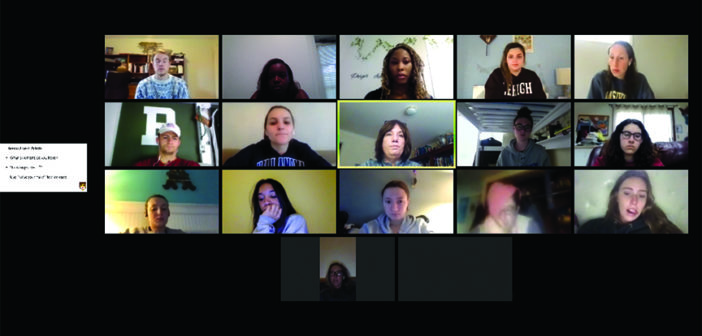As online classes use Zoom as their virtual platform, the rise of “Zoom hacking” or “Zoom bombing,” a new phenomenon where unwanted guests join meetings reserved for a select group of people, has been on the rise across the country — and it’s come to Lehigh, too.
While the university is trying to maintain a sense of normalcy during remote learning, Zoom hacking adds an extra challenge to the current extraordinary circumstances.
Tracie Dinh, ‘22, said she had a strange encounter during her ART 096 class.
“It was toward the end of my lecture when my professor was wishing us a nice weekend,” Dinh said. “Two people popped up on the screen, and one said, ‘I love you.’ My professor was super confused, but laughed it off, thinking it was a student in the class, while it really was not.
While some of these hackings have been harmless, like Dinh’s experience, some have been hurtful to students and professors.
Professor Seth Richards-Shubik’s ECO 045 Zoom class was hacked last week. He said he believes the hackers randomly guessed the Zoom ID for the meeting, and therefore, were able to enter his session.
“The first intruder harassed one of our students by asking her to find him on Instagram (multiple times),” he said. “That harassment was hurtful to the student who was targeted, and potentially to others in the meeting who may have experienced similar harassment in other circumstances. I removed the two intruders at that point, as it was apparent that they were not authorized to be on the call, and most likely not Lehigh students.”
Richards-Shubik said the university has a recording of the lecture and is conducting further investigation.
Bridget Hall, ‘22, had a similar experience in her ACCT 152 class when an intruder joined.
She said there were prospective Lehigh students in the Zoom class, who were looking to get a feel for the university through this “accepted students” opportunity. Therefore, the Zoom link was more likely shared amongst a larger crowd than usual, making it more susceptible to hacking.
Hall said there were three hackers, but she could only see two of their names. She said they all came into the sessions under school-inappropriate names.
“(One) hacker told the (the other hacker) to shut up,” Hall said. “And the kid responded with, ‘Shut up Kyle, I’ll sauce you next class.’”
The professor questioned who the disrupter was, first believing he was a prospective high school student, but the intruder insisted he was a member of the class.
Lehigh Library and Technology Services has been monitoring the security reports related to Zoom, said Ilena Key, chief technology officer for Library and Technology Services.
“Lehigh only started to see a few issues last week, there were between 5-10 incidents reports and LTS has worked with faculty and staff to make sure sessions are secure moving forward,” Key said. “We will continue to monitor the security information related to Zoom, and to inform our community of any potential issues and the best practices moving forward. We want to do everything possible, make sure our online classes and meetings only have the intended people in them.”
Equal Opportunity Compliance Coordinator Karen Salvemini sent an email to students on April 10, reminding the Lehigh community that the university prioritizes maintaining an academic program and workplace environment free from harassment, discrimination, retaliation, and sexual misconduct.
“University policies on harassment, discrimination, retaliation, and sexual misconduct apply to behaviors that occur in person between members of the university community, but also apply to online and virtual misconduct,” Salvemini said in the email. “Any behavior that is prohibited by policy is also likely prohibited in cyber-forms, including cyber-harassment, cyber-bullying that is based on a protected characteristic, and cyber-stalking. Zoom-bombing involving offensive pictures or statements based on any of the protected characteristics covered by University policy should be reported to me as Equal Opportunity Compliance Coordinator and/or Lehigh University Police Department.”






Comment policy
Comments posted to The Brown and White website are reviewed by a moderator before being approved. Incendiary speech or harassing language, including comments targeted at individuals, may be deemed unacceptable and not published. Spam and other soliciting will also be declined.
The Brown and White also reserves the right to not publish entirely anonymous comments.